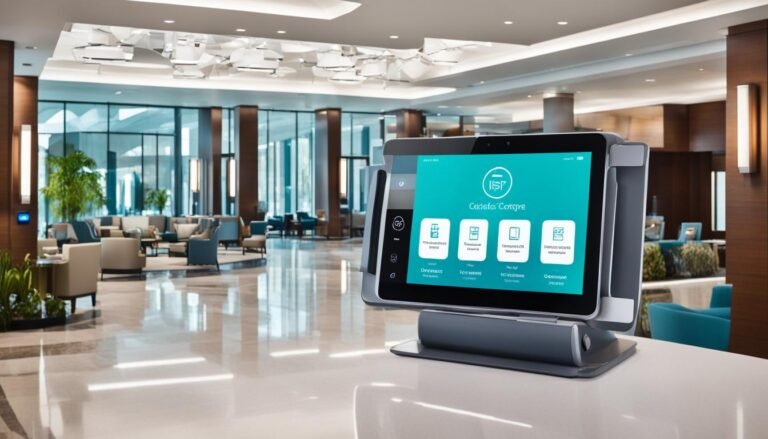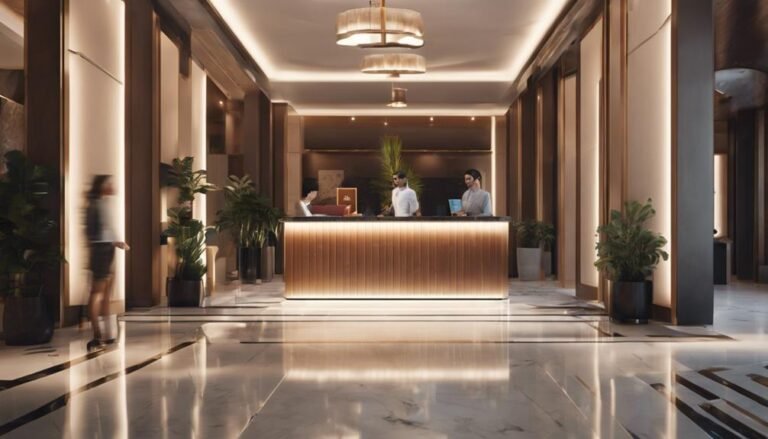Understanding and Leveraging Hospitality Trends
In an ever-changing industry, hospitality professionals are constantly challenged to stay ahead of the curve by understanding and leveraging emerging trends. From evolving guest expectations to the integration of technology, the landscape of hospitality is undergoing a transformation that demands a keen awareness of consumer behavior and market dynamics.
As we navigate the complexities of this dynamic environment, it becomes imperative to explore the implications of these trends and strategically position our businesses to capitalize on the opportunities they present.
Key Takeaways
- Luxury amenities and personalized experiences are now expected by guests across various segments of the hospitality industry.
- Technology integration enhances guest experience, streamlines operations, and delivers tailored and memorable experiences.
- Sustainability and eco-friendly practices are increasingly important in hospitality, with a focus on energy and water conservation, waste reduction, and locally sourced products.
- Food and beverage trends include a rise in plant-based options, emphasis on sustainability and health-conscious dining, and the popularity of craft cocktails with unique ingredients and techniques.
Evolving Guest Expectations
As the hospitality industry continues to evolve, it becomes increasingly apparent that guests’ expectations are undergoing a significant transformation, impacting the way hotels and accommodations approach customer service and experience. The demand for luxury amenities is no longer limited to high-end properties; instead, it has become an expectation across various segments of the industry. Guests now seek personalized and unique experiences, prompting hotels to shift their focus towards experiential design. This involves creating spaces and services that go beyond the traditional, to stimulate all the senses and leave a lasting impression.
Experiential design is about crafting an environment that tells a story and connects with the emotions of the guests. It includes elements such as interactive technology, immersive themed spaces, and locally inspired decor. Hotels are increasingly incorporating wellness amenities, eco-friendly initiatives, and curated local experiences to cater to the evolving tastes of their guests.
Understanding and adapting to these changing preferences is crucial for hotels to stay competitive and relevant in today’s market. By embracing luxury amenities and experiential design, accommodations can meet the shifting expectations of their guests and deliver memorable, immersive experiences.
Technology Integration
With the rapid advancement of technology, the integration of innovative digital solutions has become a pivotal factor in shaping the guest experience within the hospitality industry. This integration is not only a response to the growing demand for efficiency and convenience but also a strategic approach to meet evolving guest expectations.
Several key trends are driving this transformation:
- Smart Automation: The use of smart technology for automated check-ins, room customization, and personalized experiences is rapidly gaining traction. From smart room controls to automated billing processes, these technologies streamline operations while enhancing the overall guest experience.
- Digital Concierge: The implementation of digital concierge services through mobile apps and virtual assistants allows guests to access information, make reservations, and request services seamlessly. This not only provides convenience to guests but also enables hotels to gather valuable data to personalize and improve the guest experience.
- Data-driven Personalization: Leveraging guest data to personalize services and offerings is becoming increasingly important. By utilizing data analytics, hotels can anticipate guest needs and preferences, thereby delivering a more tailored and memorable experience.
The integration of these technological advancements is redefining the hospitality landscape, creating new opportunities for operational efficiency and elevated guest satisfaction.
Sustainability and Eco-Friendly Practices
The growing emphasis on sustainability and eco-friendly practices within the hospitality industry reflects a fundamental shift towards responsible and ethical business operations. As consumers become increasingly environmentally conscious, hotels and resorts are implementing various eco-friendly initiatives and sustainable practices to reduce their carbon footprint and minimize environmental impact.
| Eco-Friendly Initiatives | Description | Benefits |
|---|---|---|
| Energy-efficient lighting | Switching to LED lights and motion sensors | Reduces energy consumption and costs |
| Water conservation programs | Installing low-flow fixtures and monitoring water usage | Saves water and lowers utility expenses |
| Waste reduction strategies | Implementing recycling programs and composting initiatives | Minimizes landfill waste and promotes sustainability |
| Locally sourced products | Using local suppliers for food and amenities | Supports local economy and reduces carbon emissions |
Personalized Experiences
As the hospitality industry continues to evolve, personalized experiences have emerged as a key trend that is reshaping the guest experience. Customized guest interactions and tailored service offerings are becoming essential elements for hotels and other hospitality businesses looking to distinguish themselves in a competitive market.
Customized Guest Interactions
In response to the evolving expectations of modern guests, the hospitality industry is increasingly prioritizing customized guest interactions to deliver personalized experiences that resonate on a deeper level. This trend encompasses various aspects of guest interactions, including:
- Personalized Greetings
- Utilizing guest data to address individuals by name upon arrival
- Tailoring welcome messages and gestures based on guest preferences and past interactions
- Customized Amenities
- Offering amenities and services tailored to the specific needs and preferences of each guest
- Providing personalized recommendations for local attractions, dining, and activities based on guest profiles
Tailored Service Offerings
Amidst the shifting landscape of the hospitality industry, personalized experiences are emerging as a pivotal element of tailored service offerings, elevating guest satisfaction and loyalty to unprecedented levels. Understanding and implementing personalized amenities that align with guest preferences have become essential for hospitality providers seeking to differentiate themselves in a competitive market.
By gathering data on guest preferences and behavior, hotels and other hospitality establishments can offer tailored services, creating a sense of exclusivity and care. This approach not only enhances the overall guest experience but also fosters lasting connections, leading to increased customer loyalty and positive word-of-mouth.
With the advancement of technology, including data analytics and personalized marketing, hospitality providers are better equipped than ever to anticipate and fulfill individual guest needs, further strengthening their position in the market.
Shifts in Food and Beverage Trends
The landscape of food and beverage trends is undergoing significant shifts as consumer preferences continue to evolve and industry innovations reshape the culinary experience. This has led to the rise of plant-based options and a heightened focus on sustainable and health-conscious dining.
Additionally, craft cocktails have gained popularity, with mixologists experimenting with unique ingredients and techniques to create innovative and personalized beverage offerings. These trends reflect a growing emphasis on wellness, sustainability, and experiential dining, influencing the way food and beverage establishments cater to their patrons.
- Plant-Based Options
- Increasing demand for plant-based dishes
- Incorporation of diverse and creative plant-based ingredients
- Emphasis on sustainability and ethical dining practices
- Craft Cocktails
- Rising popularity of artisanal and handcrafted cocktails
- Experimentation with unique flavor profiles and presentation
- Personalization and customization to cater to individual preferences
These shifts in food and beverage trends not only cater to evolving consumer preferences but also present opportunities for businesses to differentiate themselves and elevate the overall dining experience. By understanding and leveraging these trends, hospitality establishments can stay ahead of the curve and meet the changing demands of their clientele.
Embracing Cultural Diversity
Embracing cultural diversity in the hospitality industry presents an opportunity to enrich the guest experience and cater to a broad range of preferences and traditions. Cultural immersion is key to understanding and meeting the needs of diverse clientele. By embracing inclusive practices, such as celebrating different cultural holidays, offering multilingual services, and providing cuisine options that reflect a variety of cultures, hospitality establishments can create a welcoming and inclusive environment for guests from all backgrounds.
Incorporating cultural diversity into the hospitality experience not only enhances the appeal of a venue but also fosters a sense of belonging and acceptance for guests. It allows for the creation of unique and memorable experiences that resonate with individuals on a personal level.
Moreover, by embracing cultural diversity, hospitality businesses can attract a wider customer base and build strong, lasting relationships with patrons who appreciate and seek out inclusive establishments.
Adaptation to Remote Work Trends
The shift towards remote work has brought about numerous benefits for both employees and employers. These benefits include increased flexibility and reduced commuting stress. However, it has also presented challenges related to maintaining productivity and communication within teams.
Understanding and addressing these challenges is crucial for businesses to effectively adapt to the evolving landscape of remote work trends.
Remote Work Benefits
Adapting to remote work trends requires a strategic approach that prioritizes flexibility, communication, and productivity. Remote work offers numerous benefits that contribute to work-life balance and virtual collaboration:
- Work-Life Balance:
- Remote work allows employees to better balance their professional and personal lives, leading to increased job satisfaction and overall well-being.
- Flexibility in work hours enables individuals to attend to personal commitments while still fulfilling their professional responsibilities.
- Virtual Collaboration:
- Remote work fosters virtual collaboration, allowing teams to connect regardless of geographical location.
- Tools such as video conferencing and project management software facilitate seamless communication and teamwork.
- Increased Productivity:
- Many remote workers report higher productivity levels due to reduced office distractions and a personalized work environment.
- The ability to work in a comfortable setting often leads to improved focus and efficiency.
Productivity Challenges
Amid the shift towards remote work, organizations face a spectrum of productivity challenges that necessitate strategic solutions and a nuanced understanding of the evolving work landscape. Two critical aspects that require attention in this scenario are work-life balance and time management. Achieving a balance between work and personal life can be challenging when working from home, leading to potential burnout and decreased productivity. Additionally, effective time management becomes crucial as the boundaries between professional and personal time blur in a remote work setup. To visualize the productivity challenges faced in remote work, consider the following table:
| Productivity Challenges | Strategic Solutions |
|---|---|
| Work-life balance | Implement flexible work schedules |
| Time management | Encourage regular breaks |
Conclusion
In conclusion, the hospitality industry must be proactive in understanding and leveraging current trends to meet the evolving expectations of guests. By embracing technology, sustainability, personalized experiences, and shifts in food and beverage trends, businesses can stay ahead of the curve.
Additionally, embracing cultural diversity and adapting to remote work trends will be key in staying relevant and competitive in the ever-changing landscape of the hospitality industry.
As the saying goes, ‘The only constant in life is change.’







